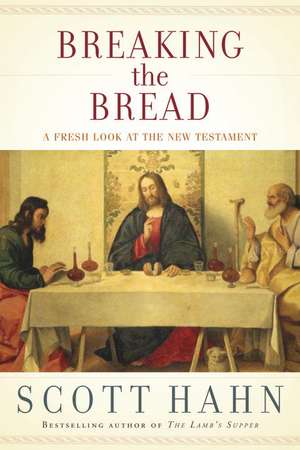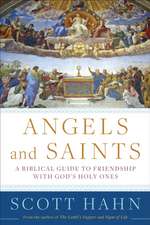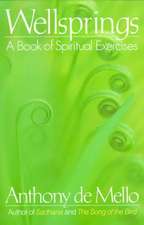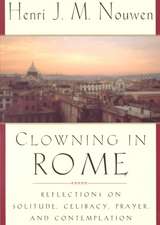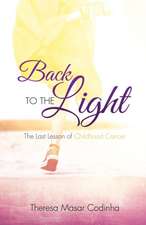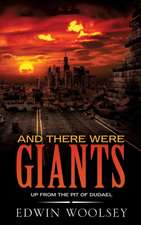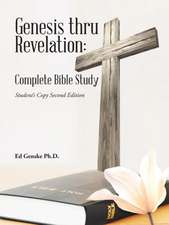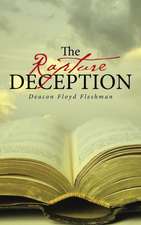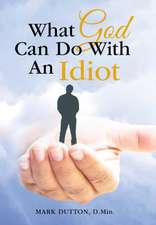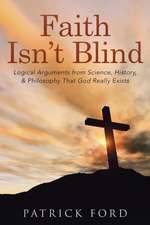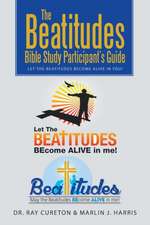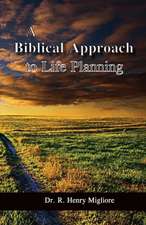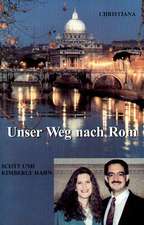Consuming the Word: The New Testament and the Eucharist in the Early Church
Autor Scott Hahnen Limba Engleză Hardback – 27 mai 2013
Long before the New Testament was a document, it was a sacrament. Jesus called the Eucharist by the name Christians subsequently gave to the latter books of the Holy Bible. It was the "New Covenant," the "New Testament," in his blood. Christians later extended the phrase to cover the books produced by the apostles and their companions; but they did so because these were the books that could be read at Mass.
This simple and demonstrable historical fact has enormous implications for the way we read the Bible. In Consuming the Word: The New Testament and the Eucharist in the Early Church, Dr. Scott Hahn undertakes an examination of some of Christianity's most basic terms to discover what they meant to the sacred authors, the apostolic preachers, and their first hearers. Moreover, at a time when the Church is embarking on a New Evangelization he draws lessons for Christians today to help solidify their understanding of the why it is Catholics do what Catholics do.
Anyone acquainted with the rich body of writing that flows so inspiringly from the hand and heart of Dr. Hahn knows that he brings profound personal insight to his demonstrated theological expertise,” writes Cardinal Donald Wuerl in the foreword to the book. Consuming the Word continues in that illustrious tradition. It brings us a powerful and welcome guide as we take our place in the great and challenging work in sharing the Good News.
Preț: 122.69 lei
Nou
Puncte Express: 184
Preț estimativ în valută:
23.48€ • 24.58$ • 19.43£
23.48€ • 24.58$ • 19.43£
Carte disponibilă
Livrare economică 15-29 martie
Preluare comenzi: 021 569.72.76
Specificații
ISBN-13: 9780307590817
ISBN-10: 030759081X
Pagini: 159
Dimensiuni: 155 x 211 x 20 mm
Greutate: 0.3 kg
Editura: IMAGE
ISBN-10: 030759081X
Pagini: 159
Dimensiuni: 155 x 211 x 20 mm
Greutate: 0.3 kg
Editura: IMAGE
Extras
Chapter 1
The Sacrament of the Scroll
An ancient tradition tells us the story of Saint Romanus the Melodist, the sixth-century composer of homilies in hymn form, and how he received his vocation.
Born in Syria, he was a reverent child who loved the Lord’s house. Early in life he entered the service of the Church, at first simply lighting the lamps and preparing the incense for worship. As he grew, he pursued his education in Beirut, where he was ordained a deacon.
Romanus was the sort of student who got good grades because his teachers recognized the earnestness of his efforts. He was zealous, and his zeal enabled him to do good things in spite of mediocre skills. After three years in Beirut, he moved on to serve the Church in the imperial capital, Constantinople.
He was humble enough to recognize his shortcomings, and he accepted them. In fact, he took the word “lowly” as a sort of personal title. He longed, however, to glorify God as did the deacons who were better singers. Music was such an important part of divine worship, especially in the Eastern churches. It pained Romanus that the musical quality of the services he led was so inferior to that of the services led by his colleagues.
He prayed for God to give him by grace what he lacked by nature and training. One night as he prayed he fell asleep and was visited in a dream by the Virgin Mary. She held out a scroll to him and bid him, “Take the paper and eat it.” He did as he was told. He ate the scroll. Then he awoke and immediately knew what he must do.
He dressed and ran to the church. Ascending to the pulpit, he began to sing a sermon on the birth of Jesus. The song he sang is today known as his masterpiece--one of more than a thousand verse homilies (kontakia) he composed in his remaining years. A millennium and a half later, they are still sung on the great feasts of the Church.
Consuming the Word. Even casual readers may recognize Saint Romanus’s apparition as a trope, or common figure, of mystical literature. In the archetypal instance, the prophet Ezekiel (2:9ߝ3:4) reports a similar encounter with a mighty angel:
And when I looked, behold, a hand was stretched out to me, and, lo, a written scroll was in it; and he spread it before me; and it had writing on the front and on the back, and there were written on it words of lamentation and mourning and woe. And he said to me, “Son of man, eat what is offered to you; eat this scroll, and go, speak to the house of Israel.” So I opened my mouth, and he gave me the scroll to eat. And he said to me, “Son of man, eat this scroll that I give you and fill your stomach with it.” Then I ate it; and it was in my mouth as sweet as honey. And he said to me, “Son of man, go, get you to the house of Israel, and speak with my words to them.”
The story recurs in the New Testament, in John the Seer’s encounter with a “mighty angel” come down from heaven, “wrapped in a cloud, with a rainbow over his head,” his face “like the sun, and his legs like pillars of fire” (Revelation 10:1f).
He had a little scroll open in his hand . . . I went to the angel and told him to give me the little scroll; and he said to me, “Take it and eat; it will be bitter to your stomach, but sweet as honey in your mouth.” And I took the little scroll from the hand of the angel and ate it; it was sweet as honey in my mouth, but when I had eaten it my stomach was made bitter. And I was told, “You must again prophesy about many peoples and nations and tongues and kings.”
It is an odd sort of episode, the eating of a book, and it is all the more fascinating because it occurs in not one but two biblical texts. No wonder it commanded the attention of so many of the earliest Christian commentators. By the time of his own apparition, around AD 518, Romanus, who lived in a monastic community, must have heard the works of the great interpreters read aloud many times. He could have little doubt about the meaning of his dream.
Saint Hippolytus of Rome, in the third century, was one of the earliest exegetes to produce extended commentaries. He wrote that the scroll, with its printing on front and back, “signifies the prophets and the apostles. In it the Old Covenant was written on one side and the New on the other.” Moreover, the scroll symbolizes the “secret, spiritual teaching . . . There is a connection between reading the outside and understanding the inside.” There is a connection between the Old and New Covenants, and only the one who consumes the scroll can see it.
For Saint Jerome, the Ezekiel passage contained a special message for preachers: “Unless we eat the open book first, we cannot teach the children of Israel.”
In the generation after Romanus, Saint Gregory the Great experienced the same fascination, returning repeatedly to the prophet’s text. Gregory, a pope and liturgical reformer, was a profound exegete. In his Commentary on Ezekiel he wrote: “What the Old Testament promised, the New Testament made visible. What the former announces in a hidden way, the latter openly proclaims as present. Therefore the Old Testament is a prophecy of the New Testament; and the best commentary on the Old Testament is the New Testament.”
For the Fathers--from Hippolytus and Jerome to Romanus and Gregory--the meaning was abundantly clear: Salvation comes by means of a covenant (also known by the Latin equivalent, “testament,” from testamentum); and the covenant must be consumed so that it can be shared.
To Catholic Christians, in the first century or the twenty-first, the mystical tropes always evoke the sacramental mysteries. In the instances I’ve discussed so far, it is no stretch. The visionary books of Ezekiel and John are rich with liturgical imagery. Ezekiel is much concerned with the Temple. John sees both heaven and history in terms of sacrificial liturgy: altars and priests, chalices and censers, trumpets and hymnody, culminating in a sacred banquet. In both cases, the consumption of the scroll takes place amid some experience of heavenly worship.
In John’s telling, and later in the Church’s account of Romanus’s life, there are Eucharistic overtones. Both men are invited to “take” and “eat,” two verbs familiar from the Eucharistic institution narratives since the first century (see, for example, Matthew 26:26). They receive the -covenant verbally, and they take and eat that “word” as food.
In the third century, Origen, the great teacher of Alexandria, spoke of the scriptural proclamation as analogous to the sacramental communion:
You who are accustomed to attending the divine mysteries know how, when you receive the body of the Lord, you guard it with all care and reverence lest any small part should fall from it, lest any piece of the consecrated gift be lost. For you believe yourself guilty, and rightly so, if anything falls from there through your negligence. But if you are so careful to preserve his body, and rightly so, why do you think that there is less guilt to have neglected God’s word than to have neglected his body?
For Origen, there is a sacramental quality to the scroll. It is to be handled and consumed with the same decorum and attentiveness--yet hungry eagerness--as the Eucharistic bread.
In the bread and in the word there is a real presence. In the proclamation and in the sacrament the kingdom arrives with the king himself. Pope Benedict XVI wrote, “Thus we grow in the realization, so clear to the Fathers of the Church, that the proclamation of the word has as its content the Kingdom of God (cf. Mark 1:14ߝ15), which, in the memorable phrase of Origen, is the very person of Jesus (Autobasileia).”
This is the truth Romanus knew, and Jerome, and Gregory, and John experienced, and Ezekiel foresaw. Salvation comes by way of a covenant--a covenant embodied in a Word, a Word that is made flesh, a Word that is consumed.
The prophets and seers speak to us in images, and their images convey mysteries. As we come to understand these mysteries, we must use words to speak of them. God made us to communicate verbally. He himself created this aspect of human nature and accommodated it as he inspired the Scriptures--which are, literally, hai graphai, “the writings.” For Ezekiel and for John, God committed his word to a scroll before inviting them to consume it.
God reveals himself and gives himself in the scroll. What begins as poetry, however, we can allow to degenerate into jargon; and so the Greco-Latinate terms “covenant,” “testament,” “liturgy,” and “Eucharist”--all workaday words that inspired our ancestors to sing--now drop with the thud of a technical vocabulary.
It is probably not a modern problem, but rather a perennial temptation. Yet our recovery of the newness of that vocabulary--the New Testament, the New Covenant--is especially urgent right now, as the Church embarks upon a New Evangelization.
Evangelization is a dynamic process by which we share the Gospel (the Good News) with others. Yet we cannot deliver what we do not first possess. Ezekiel consumed the word of his prophetic message. John, too, took it and ate it. Romanus consumed it, digested it, and it became part of him; and then he shared what he had received. These men first knew communion with the Word, and only then were they able to take the Word out to the world.
We all need to sense once again the savor of Ezekiel’s foretaste, John’s banquet, Romanus’s song. That is the reason I wrote this book: to undertake a study of a few of Christianity’s most basic terms, and to find out what they meant to the sacred authors, the apostolic preachers, and their first hearers. If we consume the Word as they intended when they served the Word, then we can be transformed as the early disciples were transformed, and then perhaps our world can be remade and renewed as theirs was remade and renewed.
Chapter 2
Before the Book
If someone asks about the basics of Christianity, the foundations of our faith, we instinctively draw from literary terms. We speak of the “New Testament,” and by that we mean a book. We point to the “Gospel,” and by that we mean a literary form, a kind of sacred biography. We use these terms as titles of specific ancient documents, texts that were composed millennia ago and fixed permanently by a “canon,” which we understand to be an unchangeable table of contents.
“New Testament” is indeed a foundational term. Today, it’s most commonly used to describe the second division of the Christian Bible, the later-written and smaller division, which consists of twenty-seven books. All of those individual books were written after the earthly ministry of Jesus, and they reflect upon that ministry and its implications for humanity. “New Testament,” then, is a book title, and it belongs to Christianity’s most sacred and authoritative text.
If “New Testament” is a title, then it’s only sensible that modern Christians use literary terms to talk about it. But here’s the problem: We have no evidence that anyone in the first century used the term that way. In fact, we don’t find “New Testament” applied to the Christian Scriptures until the very end of the second century; and only in the middle of the third century does the term appear with some degree of frequency. We do find it early on, but it does not refer to a written work. In fact, it has quite a different meaning, which we’ll get to in a moment.
Yet even when authors did get around to calling the book by that name, they didn’t always agree on which texts belong in the book. Although there was widespread agreement about the four Gospels, the Acts of the Apostles, and most of Saint Paul’s letters, there was a bit of contention about the so-called Catholic Epistles, attributed to Peter, James, and John, about the Letter to the Hebrews, and about the book of Revelation. There was, moreover, a handful of books that were considered “Scripture” in some local churches but not in others: the first-century letters attributed to Barnabas and Clement, for example, and the visionary book called The Shepherd, by Hermas of Rome. Not until the fourth century do we find a “canon” with exactly the same list of books as you’ll find in today’s Christian Bible.
The faith of the first-generation Christians was centered on something they called the “New Testament,” although ordinary believers and even the Church’s leaders had only limited exposure to the sacred texts. They did not have the benefit of a fixed canon. Few people had access to books anyway.
We all agree that the life of those early Christians is somehow exemplary and normative for Christians today. If we are to succeed in the Church’s New Evangelization, it will be at least partly because we follow the pattern of the first evangelization. The love of Christ compels us to understand their terminology on their terms.
To understand the mind of the earliest Christians we need to exercise our imagination, for we’re talking about a time before the advent of mass media. There were no electronic or instantaneous communications--nothing like television, radio, podcasts, e-mail, or the World Wide Web. Ordinary postal mail could take months to reach its destination.
Neither was there a printing press. Book production was laborious. Scribes--who were skilled, highly paid professionals--spent hours copying out legible pages by hand with pen and ink. Just one copy of a book could require a month to complete. Only the very wealthy could afford to own such volumes, and usually no more than a few. In most places, moreover, education was available only to the elites. Literacy levels in the Greco-Roman world were relatively low, so there was not a large ready market for books. It’s probably safe to say that the early Christians could not have imagined a world where the Bible was waiting in a drawer in every hotel bedroom or was mechanically searchable in a pocket electronic device.
Nevertheless, we find--from the very beginning--a profound reverence for the sacred writings: graphai in Greek, usually translated to English as “Scriptures.” Most of the time when the word is used in the New Testament books, it refers to the books of the Old Testament. That’s how Jesus uses the term when he says, “the scriptures . . . bear witness to me” (John 5:39). That’s how Saint Luke uses the term when he says that “beginning with Moses and all the prophets, [Jesus] interpreted to [his companions on the road to Emmaus] in all the scriptures the things concerning himself” (Luke 24:27).
The Sacrament of the Scroll
An ancient tradition tells us the story of Saint Romanus the Melodist, the sixth-century composer of homilies in hymn form, and how he received his vocation.
Born in Syria, he was a reverent child who loved the Lord’s house. Early in life he entered the service of the Church, at first simply lighting the lamps and preparing the incense for worship. As he grew, he pursued his education in Beirut, where he was ordained a deacon.
Romanus was the sort of student who got good grades because his teachers recognized the earnestness of his efforts. He was zealous, and his zeal enabled him to do good things in spite of mediocre skills. After three years in Beirut, he moved on to serve the Church in the imperial capital, Constantinople.
He was humble enough to recognize his shortcomings, and he accepted them. In fact, he took the word “lowly” as a sort of personal title. He longed, however, to glorify God as did the deacons who were better singers. Music was such an important part of divine worship, especially in the Eastern churches. It pained Romanus that the musical quality of the services he led was so inferior to that of the services led by his colleagues.
He prayed for God to give him by grace what he lacked by nature and training. One night as he prayed he fell asleep and was visited in a dream by the Virgin Mary. She held out a scroll to him and bid him, “Take the paper and eat it.” He did as he was told. He ate the scroll. Then he awoke and immediately knew what he must do.
He dressed and ran to the church. Ascending to the pulpit, he began to sing a sermon on the birth of Jesus. The song he sang is today known as his masterpiece--one of more than a thousand verse homilies (kontakia) he composed in his remaining years. A millennium and a half later, they are still sung on the great feasts of the Church.
Consuming the Word. Even casual readers may recognize Saint Romanus’s apparition as a trope, or common figure, of mystical literature. In the archetypal instance, the prophet Ezekiel (2:9ߝ3:4) reports a similar encounter with a mighty angel:
And when I looked, behold, a hand was stretched out to me, and, lo, a written scroll was in it; and he spread it before me; and it had writing on the front and on the back, and there were written on it words of lamentation and mourning and woe. And he said to me, “Son of man, eat what is offered to you; eat this scroll, and go, speak to the house of Israel.” So I opened my mouth, and he gave me the scroll to eat. And he said to me, “Son of man, eat this scroll that I give you and fill your stomach with it.” Then I ate it; and it was in my mouth as sweet as honey. And he said to me, “Son of man, go, get you to the house of Israel, and speak with my words to them.”
The story recurs in the New Testament, in John the Seer’s encounter with a “mighty angel” come down from heaven, “wrapped in a cloud, with a rainbow over his head,” his face “like the sun, and his legs like pillars of fire” (Revelation 10:1f).
He had a little scroll open in his hand . . . I went to the angel and told him to give me the little scroll; and he said to me, “Take it and eat; it will be bitter to your stomach, but sweet as honey in your mouth.” And I took the little scroll from the hand of the angel and ate it; it was sweet as honey in my mouth, but when I had eaten it my stomach was made bitter. And I was told, “You must again prophesy about many peoples and nations and tongues and kings.”
It is an odd sort of episode, the eating of a book, and it is all the more fascinating because it occurs in not one but two biblical texts. No wonder it commanded the attention of so many of the earliest Christian commentators. By the time of his own apparition, around AD 518, Romanus, who lived in a monastic community, must have heard the works of the great interpreters read aloud many times. He could have little doubt about the meaning of his dream.
Saint Hippolytus of Rome, in the third century, was one of the earliest exegetes to produce extended commentaries. He wrote that the scroll, with its printing on front and back, “signifies the prophets and the apostles. In it the Old Covenant was written on one side and the New on the other.” Moreover, the scroll symbolizes the “secret, spiritual teaching . . . There is a connection between reading the outside and understanding the inside.” There is a connection between the Old and New Covenants, and only the one who consumes the scroll can see it.
For Saint Jerome, the Ezekiel passage contained a special message for preachers: “Unless we eat the open book first, we cannot teach the children of Israel.”
In the generation after Romanus, Saint Gregory the Great experienced the same fascination, returning repeatedly to the prophet’s text. Gregory, a pope and liturgical reformer, was a profound exegete. In his Commentary on Ezekiel he wrote: “What the Old Testament promised, the New Testament made visible. What the former announces in a hidden way, the latter openly proclaims as present. Therefore the Old Testament is a prophecy of the New Testament; and the best commentary on the Old Testament is the New Testament.”
For the Fathers--from Hippolytus and Jerome to Romanus and Gregory--the meaning was abundantly clear: Salvation comes by means of a covenant (also known by the Latin equivalent, “testament,” from testamentum); and the covenant must be consumed so that it can be shared.
To Catholic Christians, in the first century or the twenty-first, the mystical tropes always evoke the sacramental mysteries. In the instances I’ve discussed so far, it is no stretch. The visionary books of Ezekiel and John are rich with liturgical imagery. Ezekiel is much concerned with the Temple. John sees both heaven and history in terms of sacrificial liturgy: altars and priests, chalices and censers, trumpets and hymnody, culminating in a sacred banquet. In both cases, the consumption of the scroll takes place amid some experience of heavenly worship.
In John’s telling, and later in the Church’s account of Romanus’s life, there are Eucharistic overtones. Both men are invited to “take” and “eat,” two verbs familiar from the Eucharistic institution narratives since the first century (see, for example, Matthew 26:26). They receive the -covenant verbally, and they take and eat that “word” as food.
In the third century, Origen, the great teacher of Alexandria, spoke of the scriptural proclamation as analogous to the sacramental communion:
You who are accustomed to attending the divine mysteries know how, when you receive the body of the Lord, you guard it with all care and reverence lest any small part should fall from it, lest any piece of the consecrated gift be lost. For you believe yourself guilty, and rightly so, if anything falls from there through your negligence. But if you are so careful to preserve his body, and rightly so, why do you think that there is less guilt to have neglected God’s word than to have neglected his body?
For Origen, there is a sacramental quality to the scroll. It is to be handled and consumed with the same decorum and attentiveness--yet hungry eagerness--as the Eucharistic bread.
In the bread and in the word there is a real presence. In the proclamation and in the sacrament the kingdom arrives with the king himself. Pope Benedict XVI wrote, “Thus we grow in the realization, so clear to the Fathers of the Church, that the proclamation of the word has as its content the Kingdom of God (cf. Mark 1:14ߝ15), which, in the memorable phrase of Origen, is the very person of Jesus (Autobasileia).”
This is the truth Romanus knew, and Jerome, and Gregory, and John experienced, and Ezekiel foresaw. Salvation comes by way of a covenant--a covenant embodied in a Word, a Word that is made flesh, a Word that is consumed.
The prophets and seers speak to us in images, and their images convey mysteries. As we come to understand these mysteries, we must use words to speak of them. God made us to communicate verbally. He himself created this aspect of human nature and accommodated it as he inspired the Scriptures--which are, literally, hai graphai, “the writings.” For Ezekiel and for John, God committed his word to a scroll before inviting them to consume it.
God reveals himself and gives himself in the scroll. What begins as poetry, however, we can allow to degenerate into jargon; and so the Greco-Latinate terms “covenant,” “testament,” “liturgy,” and “Eucharist”--all workaday words that inspired our ancestors to sing--now drop with the thud of a technical vocabulary.
It is probably not a modern problem, but rather a perennial temptation. Yet our recovery of the newness of that vocabulary--the New Testament, the New Covenant--is especially urgent right now, as the Church embarks upon a New Evangelization.
Evangelization is a dynamic process by which we share the Gospel (the Good News) with others. Yet we cannot deliver what we do not first possess. Ezekiel consumed the word of his prophetic message. John, too, took it and ate it. Romanus consumed it, digested it, and it became part of him; and then he shared what he had received. These men first knew communion with the Word, and only then were they able to take the Word out to the world.
We all need to sense once again the savor of Ezekiel’s foretaste, John’s banquet, Romanus’s song. That is the reason I wrote this book: to undertake a study of a few of Christianity’s most basic terms, and to find out what they meant to the sacred authors, the apostolic preachers, and their first hearers. If we consume the Word as they intended when they served the Word, then we can be transformed as the early disciples were transformed, and then perhaps our world can be remade and renewed as theirs was remade and renewed.
Chapter 2
Before the Book
If someone asks about the basics of Christianity, the foundations of our faith, we instinctively draw from literary terms. We speak of the “New Testament,” and by that we mean a book. We point to the “Gospel,” and by that we mean a literary form, a kind of sacred biography. We use these terms as titles of specific ancient documents, texts that were composed millennia ago and fixed permanently by a “canon,” which we understand to be an unchangeable table of contents.
“New Testament” is indeed a foundational term. Today, it’s most commonly used to describe the second division of the Christian Bible, the later-written and smaller division, which consists of twenty-seven books. All of those individual books were written after the earthly ministry of Jesus, and they reflect upon that ministry and its implications for humanity. “New Testament,” then, is a book title, and it belongs to Christianity’s most sacred and authoritative text.
If “New Testament” is a title, then it’s only sensible that modern Christians use literary terms to talk about it. But here’s the problem: We have no evidence that anyone in the first century used the term that way. In fact, we don’t find “New Testament” applied to the Christian Scriptures until the very end of the second century; and only in the middle of the third century does the term appear with some degree of frequency. We do find it early on, but it does not refer to a written work. In fact, it has quite a different meaning, which we’ll get to in a moment.
Yet even when authors did get around to calling the book by that name, they didn’t always agree on which texts belong in the book. Although there was widespread agreement about the four Gospels, the Acts of the Apostles, and most of Saint Paul’s letters, there was a bit of contention about the so-called Catholic Epistles, attributed to Peter, James, and John, about the Letter to the Hebrews, and about the book of Revelation. There was, moreover, a handful of books that were considered “Scripture” in some local churches but not in others: the first-century letters attributed to Barnabas and Clement, for example, and the visionary book called The Shepherd, by Hermas of Rome. Not until the fourth century do we find a “canon” with exactly the same list of books as you’ll find in today’s Christian Bible.
The faith of the first-generation Christians was centered on something they called the “New Testament,” although ordinary believers and even the Church’s leaders had only limited exposure to the sacred texts. They did not have the benefit of a fixed canon. Few people had access to books anyway.
We all agree that the life of those early Christians is somehow exemplary and normative for Christians today. If we are to succeed in the Church’s New Evangelization, it will be at least partly because we follow the pattern of the first evangelization. The love of Christ compels us to understand their terminology on their terms.
To understand the mind of the earliest Christians we need to exercise our imagination, for we’re talking about a time before the advent of mass media. There were no electronic or instantaneous communications--nothing like television, radio, podcasts, e-mail, or the World Wide Web. Ordinary postal mail could take months to reach its destination.
Neither was there a printing press. Book production was laborious. Scribes--who were skilled, highly paid professionals--spent hours copying out legible pages by hand with pen and ink. Just one copy of a book could require a month to complete. Only the very wealthy could afford to own such volumes, and usually no more than a few. In most places, moreover, education was available only to the elites. Literacy levels in the Greco-Roman world were relatively low, so there was not a large ready market for books. It’s probably safe to say that the early Christians could not have imagined a world where the Bible was waiting in a drawer in every hotel bedroom or was mechanically searchable in a pocket electronic device.
Nevertheless, we find--from the very beginning--a profound reverence for the sacred writings: graphai in Greek, usually translated to English as “Scriptures.” Most of the time when the word is used in the New Testament books, it refers to the books of the Old Testament. That’s how Jesus uses the term when he says, “the scriptures . . . bear witness to me” (John 5:39). That’s how Saint Luke uses the term when he says that “beginning with Moses and all the prophets, [Jesus] interpreted to [his companions on the road to Emmaus] in all the scriptures the things concerning himself” (Luke 24:27).
Recenzii
"Scott Hahn has a well-earned reputation as a vivid guide to the Word of God. That skill is elegantly on display here. Consuming the Word is erudite and accessible, rich in content and lucid in style -- an engaging read for anyone who seeks to better understand the profound interplay of Scripture, Liturgy and the role of the Church in Christian life." Most Reverend Charles J. Chaput, O.F.M. Cap., Archbishop of Philadelphia
"With words that are both accessible and erudite, Dr. Scott Hahn introduces us anew to the Eternal Word of the New Testament, a word that is given to us, not simply as a text in a book, but as the living and real presence of the Lord Jesus himself." Very Reverend Robert Barron, author of Catholicism: A Journey to the Heart of the Faith
"In Consuming the Word, Scott Hahn brings his trilogy on the Bible and the Mass to a brilliant climax. In it, he serves up a veritable feast of insights into the real meaning of the “New Testament,” the ancient Christian Eucharist, the Sacraments, the Canon of Scripture, the Lectionary, the Truth of the Bible, the importance of Tradition, and much, much more. If you want to deepen your hunger for the Word of God in Scripture and Word made flesh in the Eucharist, then this is the book for you." ߝ Brant Pitre, author of Jesus and the Jewish Roots of the Eucharist
"I have known about Scott Hahn since he, as an Evangelical minister, brought my brother into his community to express his concern about my becoming a Roman Catholic in 1978. His Romanization years later blessed my heart, as I saw a new generation of Catholic converts from the Evangelical world. Since then I have been most impressed by the scholarship and love of scripture he brought into his Catholic life and ministry. I am blessed to count him as a friend. This newest offering reflects the strong connection between the authority of the scriptures and the Church that confronts and challenges anyone on a similar journey into the Catholic Church." -- John Michael Talbot, author of The World is My Cloister
"Catholic scholars may debate certain details about how to understand Scripture, dogma, and liturgy, but all can agree that these three realities inseparably illuminate each other. Scott Hahn powerfully articulates these connections and their consequences for the love relationship into which the God of Love calls us." -- Matthew Levering, Professor of Theology, University of Dayton
"This thoroughly enjoyable examination of the source and meaning of the New Testament is particularly needed today with the confusion brought about by the hyper-acceptance and over-application of higher-critical theories. The beauty of all of Scott's writings come from him unique ability to see the big picture, to bring together theology, history, philosophy, and biblical studies, and present it in a way that is amazingly readable and practical. In the work that we do, helping non-Catholic clergy discover the beauty and truth of the Church, this book will become an essential resource." ߝ Marcus Grodi, host of EWTN’s The Journey Home
“After reading Consuming the Word, I will never hear the phrase "New Testament" in the same way again. This book offers a soul-satisfying account of the organic connection between the liturgical life of the Church and Scripture, between the Incarnation in flesh and the Incarnation in words, between the sinlessness of Christ and the truthfulness of Scripture, which emphasizes the necessary priority of the former in each pair without in the least diminishing the indispensability of the latter. I say "soul-satisfying" because one leaves the book feeling that a spiritual need for coherence and clarity has been met.” John C. Cavadini, Professor of Theology, Director of the Institute for Church Life, University of Notre Dame
“In his latest book, Scott Hahn takes lessons from the Early Church to reveal The New Testament in a whole new light. Consuming the Word is essential reading for Catholics who want to better understand how the sacred authors and apostles affect us today." --Matthew Kelly, author of Rediscover Catholicism
Consuming the Word will increase your appetite for God and draw you into divine intimacy. Dr. Hahn brings clarity to the term "New Testament" as he moves us from text to action, from page to passion. Disciples of Christ have been called not to a text but to a covenant. The invitation to anyone studying the bible is to go deeper, to go beyond study to worship, to go beyond the words to the Word made flesh. For those who grasp the message of this book, their understanding of the Eucharistic sacrifice will never be the same." -- Jeff Cavins, author of My Life on the Rock
"With words that are both accessible and erudite, Dr. Scott Hahn introduces us anew to the Eternal Word of the New Testament, a word that is given to us, not simply as a text in a book, but as the living and real presence of the Lord Jesus himself." Very Reverend Robert Barron, author of Catholicism: A Journey to the Heart of the Faith
"In Consuming the Word, Scott Hahn brings his trilogy on the Bible and the Mass to a brilliant climax. In it, he serves up a veritable feast of insights into the real meaning of the “New Testament,” the ancient Christian Eucharist, the Sacraments, the Canon of Scripture, the Lectionary, the Truth of the Bible, the importance of Tradition, and much, much more. If you want to deepen your hunger for the Word of God in Scripture and Word made flesh in the Eucharist, then this is the book for you." ߝ Brant Pitre, author of Jesus and the Jewish Roots of the Eucharist
"I have known about Scott Hahn since he, as an Evangelical minister, brought my brother into his community to express his concern about my becoming a Roman Catholic in 1978. His Romanization years later blessed my heart, as I saw a new generation of Catholic converts from the Evangelical world. Since then I have been most impressed by the scholarship and love of scripture he brought into his Catholic life and ministry. I am blessed to count him as a friend. This newest offering reflects the strong connection between the authority of the scriptures and the Church that confronts and challenges anyone on a similar journey into the Catholic Church." -- John Michael Talbot, author of The World is My Cloister
"Catholic scholars may debate certain details about how to understand Scripture, dogma, and liturgy, but all can agree that these three realities inseparably illuminate each other. Scott Hahn powerfully articulates these connections and their consequences for the love relationship into which the God of Love calls us." -- Matthew Levering, Professor of Theology, University of Dayton
"This thoroughly enjoyable examination of the source and meaning of the New Testament is particularly needed today with the confusion brought about by the hyper-acceptance and over-application of higher-critical theories. The beauty of all of Scott's writings come from him unique ability to see the big picture, to bring together theology, history, philosophy, and biblical studies, and present it in a way that is amazingly readable and practical. In the work that we do, helping non-Catholic clergy discover the beauty and truth of the Church, this book will become an essential resource." ߝ Marcus Grodi, host of EWTN’s The Journey Home
“After reading Consuming the Word, I will never hear the phrase "New Testament" in the same way again. This book offers a soul-satisfying account of the organic connection between the liturgical life of the Church and Scripture, between the Incarnation in flesh and the Incarnation in words, between the sinlessness of Christ and the truthfulness of Scripture, which emphasizes the necessary priority of the former in each pair without in the least diminishing the indispensability of the latter. I say "soul-satisfying" because one leaves the book feeling that a spiritual need for coherence and clarity has been met.” John C. Cavadini, Professor of Theology, Director of the Institute for Church Life, University of Notre Dame
“In his latest book, Scott Hahn takes lessons from the Early Church to reveal The New Testament in a whole new light. Consuming the Word is essential reading for Catholics who want to better understand how the sacred authors and apostles affect us today." --Matthew Kelly, author of Rediscover Catholicism
Consuming the Word will increase your appetite for God and draw you into divine intimacy. Dr. Hahn brings clarity to the term "New Testament" as he moves us from text to action, from page to passion. Disciples of Christ have been called not to a text but to a covenant. The invitation to anyone studying the bible is to go deeper, to go beyond study to worship, to go beyond the words to the Word made flesh. For those who grasp the message of this book, their understanding of the Eucharistic sacrifice will never be the same." -- Jeff Cavins, author of My Life on the Rock
Cuprins
Contents
Foreword
Preface
Chapter 1: The Sacrament of the Scroll
Chapter 2: Before the Book
Chapter 3: The New Testament in the New Testament
Chapter 4: The New Testament After the New Testament
Chapter 5: The Original Setting of the New Testament
Chapter 6: The Church of the New Testament
Chapter 7: The Old Testament in the New Testament
Chapter 8: The Canon of the New Testament
Chapter 9: The New Testament and the Lectionary
Chapter 10: Trusting the Testaments: The Truth and Humility of the Word
Chapter 11: The New Testament and Christian Doctrine
Chapter 12: The Mysterious Plan in the New Testament
Chapter 13: The Sacramentality of Scripture
Chapter 14: The Testament at the Heart of the Church
Chapter 15: Coming Full Circle
Acknowledgments
Foreword
Preface
Chapter 1: The Sacrament of the Scroll
Chapter 2: Before the Book
Chapter 3: The New Testament in the New Testament
Chapter 4: The New Testament After the New Testament
Chapter 5: The Original Setting of the New Testament
Chapter 6: The Church of the New Testament
Chapter 7: The Old Testament in the New Testament
Chapter 8: The Canon of the New Testament
Chapter 9: The New Testament and the Lectionary
Chapter 10: Trusting the Testaments: The Truth and Humility of the Word
Chapter 11: The New Testament and Christian Doctrine
Chapter 12: The Mysterious Plan in the New Testament
Chapter 13: The Sacramentality of Scripture
Chapter 14: The Testament at the Heart of the Church
Chapter 15: Coming Full Circle
Acknowledgments
Notă biografică
DR. SCOTT W. HAHN holds the Fr. Michael Scanlan Chair of Biblical Theology and the New Evangelization at Franciscan University of Steubenville, where he has taught since 1990, and is the Founder and President of the St. Paul Center for Biblical Theology. In 2005, he was appointed as the Pope Benedict XVI Chair of Biblical Theology and Liturgical Proclamation at St. Vincent Seminary in Latrobe, Pennsylvania. Dr. Hahn is also the bestselling author of numerous books including The Lamb’s Supper, Reasons to Believe, and Rome Sweet Home (co-authored with his wife, Kimberly) and is editor of the Ignatius Catholic Study Bible and Letter & Spirit: A Catholic Journal of Biblical Theology. Some of his most recent books are Many Are Called, Hope for Hard Times, The Catholic Bible Dictionary, and Signs of Life. He lives in Steubenville, Ohio.
Descriere
From the bestselling author of "The Lamb's Supper" and "Signs of Life" comes an illuminating work that unlocks the many mysteries of the Catholic sacrament of the Eucharist.
